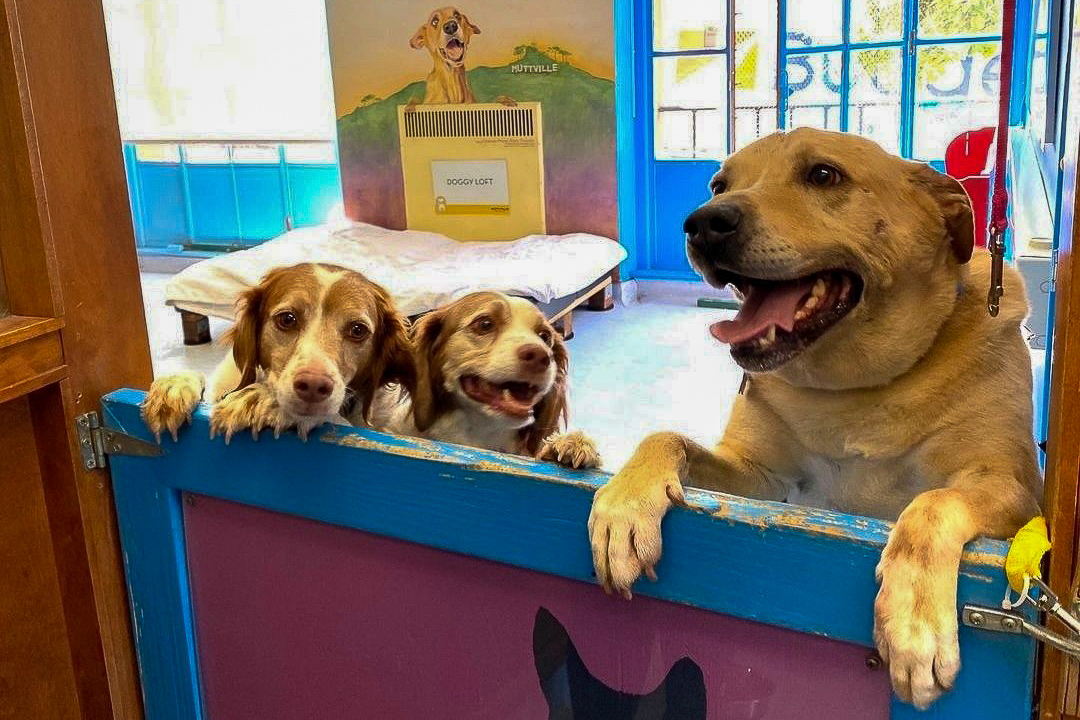In lonely pandemic times, housebound San Franciscans coped with stay-at-home orders and social-distancing through puppy love: Practically everyone adopted a dog during the early months of the pandemic, and shelters across the Bay Area saw canine adoptions skyrocket in 2020.
But now that pandemic restrictions have lifted and companies have reversed work-from-home policies, many pandemic dog parents are finding it harder and harder to spend time with their pooches—so much so that some shelters are now seeing more and more owners surrender their dogs.
“People are going back to work, they’re realizing they don’t want to leave their dog alone and they feel horrible,” said Sherri Franklin, founder and CEO of senior dog shelter Muttville. “Literally, people are saying, ‘I don’t have the time, and it really is not right for my dog to be alone.’”
It’s not just owner surrenders that are on an upswing; adoption rates haven’t grown fast enough to meet the booming population of strays, dog custody situations, owner-surrenders or transfers from other Bay Area shelters.
The result? Total intakes at local shelters have shot past pre-pandemic levels, and dogs are being turned away at stuffed shelters across the country. In SF, local adoption centers have had to turn new pups away as adoption rates lag behind.
What’s Driving SF’s Shelter Overpopulation Problem?
Animal rescues, adoption centers and even SF Animal Care and Control (SF ACC) say that there isn’t one single cause for the current overcrowding crisis. Rather, numerous pandemic-related and financial challenges sit at the root of the problem.
“We have more surrendered dogs now, and that’s starting to become more of a factor with economic reasons or people moving out of the city,” said Deb Campbell, a spokesperson at SF ACC.
It’s expensive to own pets, and with rising inflation, many San Franciscans may be hesitant to bring another pet into their lives. Pandemic puppy owners are also now finding it difficult to afford pet care as they return to work: SF dog owners report that pet boarding prices are creeping upwards, and owners are scrambling to find affordable care as demand rises and daycares fill.
One theory that has prevailed in canine control circles holds that slowing spay and neuter services during the pandemic led to a boom in the stray dog population. A 30% decline in spay-neuter surgeries in 2020 meant that, nationwide, over 3 million dogs missed these important reproductive measures, leading to rampant reproduction and clogged shelters.
Added to that, a curious boom in “custody” situations—in which individuals have to give up their animals because of an arrest or death, for example—hit SF last year. SF ACC cares for these pets while an owner cannot, and these intakes might result in the reunification of a pet with their owner. SF Animal Care and Control reported an 84% uptick in custody intakes in 2022.
Other causes for concern? Pandemic-related owner-surrenders, in which people give up pups they can no longer care for. These types of intakes declined at the ACC during the pandemic, but rose back to pre-pandemic levels last year.
Are Adoptions (or Lack Thereof) To Blame?
The combination of these factors pushed local shelter capacity over the edge, inundating them with a never-ending stream of dogs—some of which can’t be adopted quickly because of legal ownership hurdles.
“Adoptable dogs are not what are clogging shelter systems,” Campbell said. “It’s these other categories of dogs that are part of our work.” Both ACC and Muttville say that the influx in these kinds of surrenders has pushed ACC to beg San Franciscans to delay giving up their dogs, at least until kennel capacity opens up.
“Probably once a month, we put out a [social media] post saying, ‘Please, if you can, delay surrendering your dog because our kennels are full,’” Campbell said. “In the past week, we were so packed that we had to get dogs out to more rescue groups and adoption partners.”
Animal care advocates also say that the blame cannot be squarely placed on a post-pandemic lull in shelter adoptions. Rather, adoptions have remained surprisingly steady but haven’t picked up at a quick enough rate to meet the supply, with some pups sitting in shelters for months at a time.
“We haven’t seen a real drop-off in adoptions, but we have seen—at Muttville anyway—that they’re taking a little longer,” Franklin said. “But we’re still adopting out the same amount that we adopted out last year.”
Nonetheless, Animal Care and Control saw a slight dip in its Live Release Rate (LRR), or the number of animals that enter and leave the shelter alive. The LRR in the 2021-22 fiscal year sat at 91% for dogs, a 4% decline from the previous year.
Big Dogs, Big Problems
San Francisco used to have a big tiny dog problem at its shelters, with thousands of stray chihuahuas roaming the streets and flooding adoption centers—but the pandemic may have reversed this trend.
Now, shelters are reporting an uptick in stray big dogs and increased difficulty getting them adopted.
Pitbulls were the most common primary dog breed brought into Animal Care and Control in 2022, closely followed by chihuahuas. But among the 15 most common breeds brought in, large dogs comprised a much bigger share than their tiny counterparts.
And it’s not just dogs overcrowding local shelters. SF Animal Care and Control had 30-some bunnies up for adoption in October—more than the shelter could comfortably accommodate—and a “great guinea pig giveaway” has hit shelters across the country, as the number of abandoned or surrendered small animals skyrocketed in 2022.
The good news is that shelters across the Bay are working hard to make it easier—and free!—to adopt a new pet. SF Animal Care and Control is currently waiving all adoption fees for dogs and cats over 5 months, and Muttville offers free adoption for senior citizens.
Just maybe don’t name your dog Luna—there’s hundreds of them roaming around SF.
